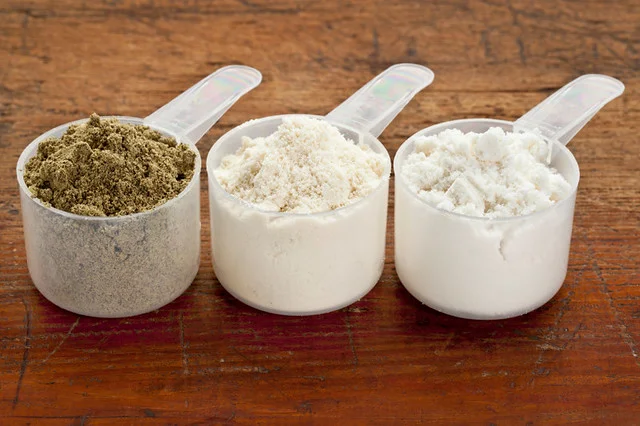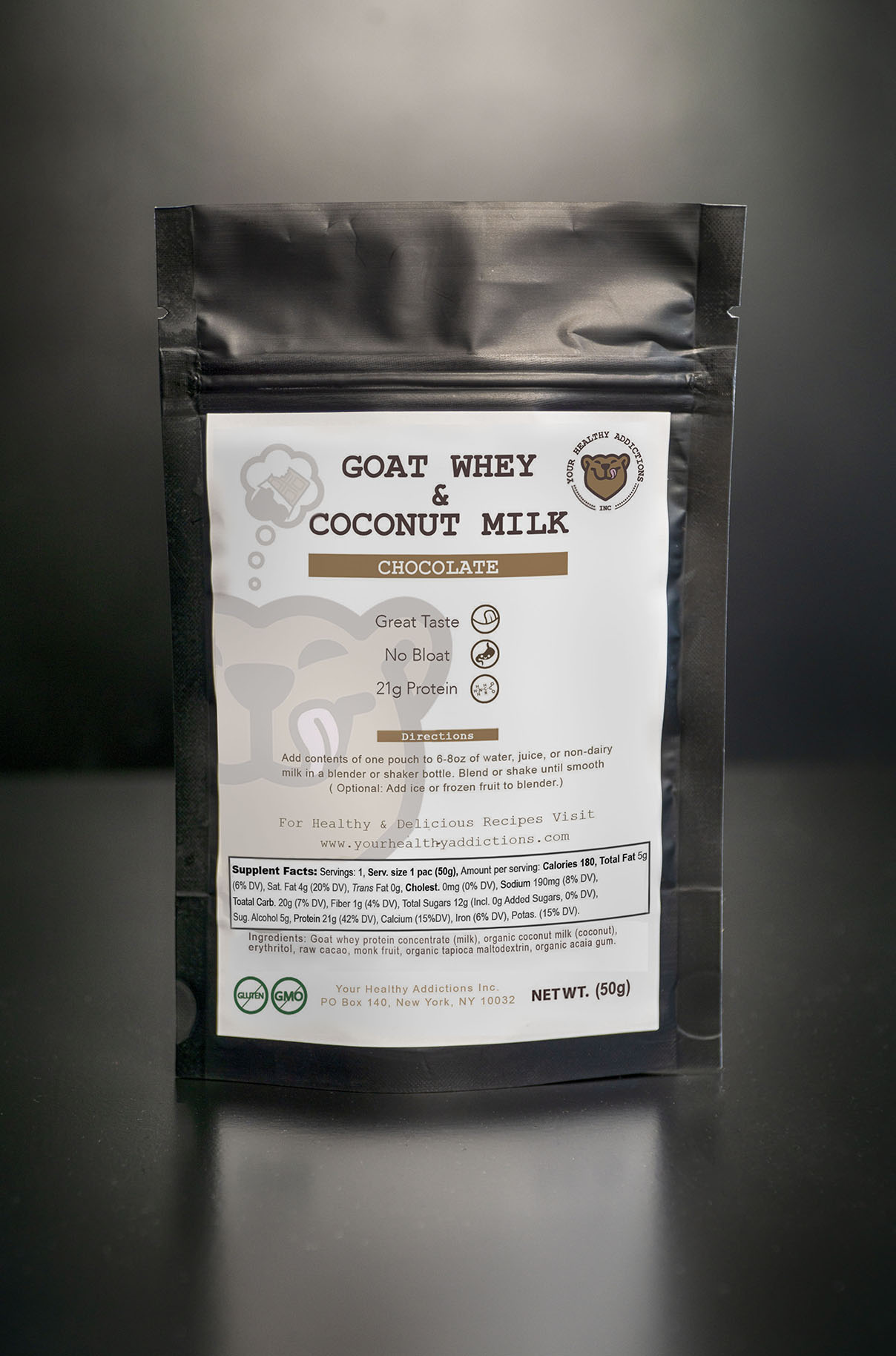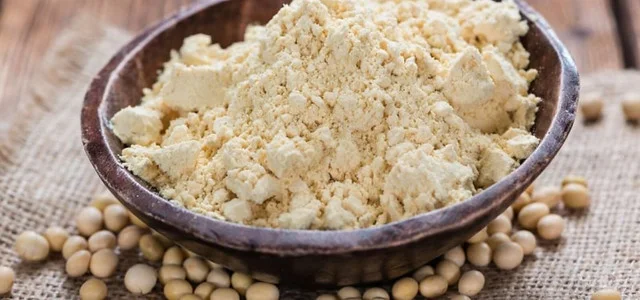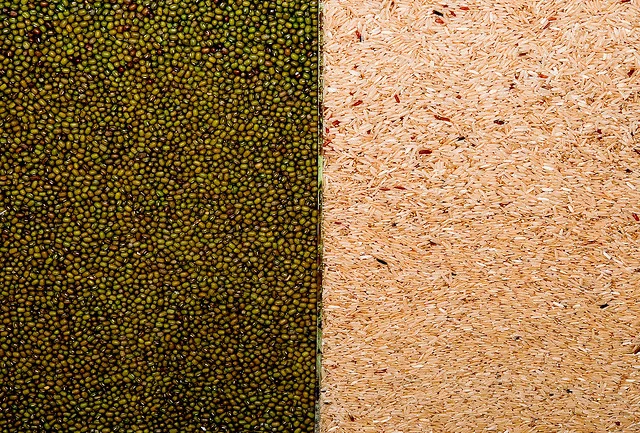Goat Wey Protein Better Than Beef
Goat Whey Protein vs Plant-Based Protein
Which protein powder supplement is the best for your needs?
With all of the varieties of protein powders available today, it can be hard to know which one will be best for you. In the past, the most widely available options were basically limited to whey and casein protein from cow's milk, egg white protein, and soy protein. As trends changed, new protein powders were introduced to the market to accommodate consumers with various food sensitivities, allergies, and dietary preferences. While this article is far from comprehensive, we'll review the lesser known goat whey protein, along with some of the more popular plant-based protein powders derived from pea, brown rice, hemp, and soy.
Before getting into a discussion of the individual protein powders, first let's take a look at the factors you should consider when choosing the best protein powder for your needs.

Protein Powder Quality
Not every gram of protein is created equal! Every protein has a unique combination of amino acids, which are the building blocks of proteins. Essential amino acids (EAA) are the amino acids that must be obtained through the diet because they cannot be synthesized in the body. Proteins that provide all nine of the essential amino acids in sufficient amounts are considered to be "complete" proteins. Proteins that are deficient in one or more of the amino acids are "incomplete". Incomplete proteins must be combined with other proteins which contain enough of the deficient amino acid(s) in order to provide a "complete" amino acid profile.
The general consensus is that as long as you meet your amino acid requirements throughout the day, it is not vital to ingest complete or complementary proteins in each individual meal. That being said, a complete protein rich in EAA and branched-chain amino acids (BCAA) will stimulate muscle muscle repair and recovery after vigorous exercise much more effectively than an incomplete protein source would [1].
Animal-based proteins, like meat, eggs and milk, are complete proteins, and in general, have a higher percentage of EAA per gram of protein than plant-based protein [2]. Consuming plant-based protein from only a single food source can result in amino acid deficiencies, but this can be easily remedied by combining a variety of plant-based foods that complement each other. Keep in mind that if you want to prioritize muscle building and you follow a strictly plant-based diet, your total protein intake should actually be higher compared to a diet that includes animal proteins. This is to make up for the lower concentration of EAA and BCAA per gram of plant protein.
Speed of Protein Digestion
Another important factor to consider is how quickly your protein is digested. Faster digesting proteins are ideal for when you want to recover quickly after a workout, or for when you need some quick fuel before exercise. On the other hand, a slower digesting protein keeps you feeling satisfied for longer by providing a steady release of amino acids into the bloodstream, which can be useful for fighting off cravings for sweets and maintaining steady energy levels throughout the day. Adding dietary fat, fiber, or other solid foods, will also slow down digestion.
Protein Powder and Food Allergy considerations
Almost all food allergens are proteins [3], and what some of the most commonly found protein powders are also some of the most allergenic. Whey and casein from cow's milk, soy protein, and egg white protein are all common food allergens. Some allergies and food sensitivities can produce severe symptoms very quickly, while more mild ones can produce low-level chronic symptoms that you may not initially associate with your diet. Symptoms like bloating, stiff or painful joints, skin breakouts, eczema, chronic fatigue, and digestive issues can all potentially be triggered by food allergies and food sensitivities.
Even if they are not an issue for you now, over consumption of any single protein source will increase the chances of developing an allergy or food sensitivity. As consumers have become more conscious of these issues, it has been a priority to produce quality hypoallergenic proteins that don't come with unpleasant side effects. Protein powders like goat whey protein, brown rice protein, and pea protein, tend to be less allergenic. In order to decrease the chances of developing a new allergy, it is best to include several types of protein in the diet.
How Does Goat Whey Protein stack up against Plant Protein?
Goat Whey Protein

Whey protein from goat's milk has many benefits over the more common whey protein from cow's milk. Similar to cow whey protein, goat whey protein is high in BCAA, EAA, and is quick to digest. It's an ideal option for bodybuilders and athletes who want to build muscle and enhance recovery after a workout. It's also a great choice for growing young bodies and the elderly who want to maintain muscle mass.
Because goat whey protein has a slightly different chemical structure than cow whey, it has the added benefit of being easier to digest and hypoallergenic compared to whey protein from cow's milk [4]. This means that people who have a sensitivity or allergy to cow whey protein and experience reactions like bloating, constipation, and skin breakouts, can consume goat whey protein and be symptom-free. Goat whey dissolves easily in water and has a mild, slightly sweet and tart taste.

For these reasons we chose to use goat whey as the featured protein in our Goat Whey & Coconut Milk™ formula that provides electrolytes, high quality protein, and a balance of macronutrients.
Soy Protein Powder
Soy protein is a plant-based protein that is widely used in packaged foods in addition t nutritional supplements. While it is a popular source of protein in vegan and vegetarian diets, it is a common food allergen, and on it's own, it is deficient in the essential amino acid methionine.
Within the scientific community, there has been some debate as to the effect of soy protein intake (and soy isoflavones in particular) on estrogen metabolism and whether it is linked to increased or decreased cancer risk [5,6]. The latest studies don't show much strong evidence either way, and having soy in the diet is generally considered to be safe. There is some evidence, however, that soy intake is correlated with decreased thyroid function in people who are iodine deficient, or who already have hypothyroidism or borderline hypothyroidism [7].

Pea Protein Powder
As there was a general shift away from marketing soy protein powder, other plant-based protein powders became more popular, with pea protein powder becoming one of the most widely used. Pea protein has a low allergy potential and tends to be tolerated well by most people. Like many plant-based proteins, pea protein isn't ideal as the sole protein source of a meal, since it is deficient in the essential amino acid methionine. While the flavor profile of pea protein is fairly neutral, it tends to have a bit of a grainy texture and doesn't dissolve as well as other proteins in liquid.
Hemp Protein Powder
Hemp protein powder is derived from the seeds of the hemp plant. While hemp protein contains all of the essential amino acids, the concentration of the amino acid lysine, is too low for it to be considered a complete protein. It is also a relatively poor source of BCAA compared to proteins like whey, pea, and brown rice. On the other hand, hemp protein is high in fiber, which makes it a great choice to include in fat loss diets since it will help to keep your hunger at bay. Hemp protein powder has an earthy, grassy, flavor. It goes well with cocoa, nut butters, and in greens drinks.
Brown Rice Protein Powder
Brown rice protein powder, is a hypoallergenic plant-based protein powder. It is used in many plant-based protein blends, and is generally a good option for those who tend to have food allergies or sensitive stomachs. On its own, it is low in the essential amino acid methionine. The texture of brown rice protein can be somewhat chalky, but the flavor is mild, and can be combined with a wide range of flavors.
Combining Plant Proteins for Higher Quality Protein
Although the individual plant protein powders don't provide the highest quality protein when eaten in isolation, the amino acid profile can be greatly improved by combining multiple protein sources to make up for the deficiencies. Soy protein and pea protein are relatively deficient and methionine, but have sufficient lysine. Meanwhile, brown rice protein and hemp protein have sufficient methionine but are low in lysine. Combining proteins that provide complementary amino acids, such as pea protein and brown rice protein together, significantly enhances the overall protein quality.

The Verdict on Goat Whey Protein vs Plant-Based Protein
The best protein powder for you depends on your goals, food sensitivities and/or allergies, and your dietary preferences. As you can see, there are multiple ways to get high quality protein in the diet. The reality is, including a variety of proteins in your diet is the best option! Even if you find a protein or blend that you like and digest well, it is a good idea to rotate through different proteins. This can help to prevent the development of food sensitivities and allergies, in addition to providing you a wider range of nutrients. Remember that when and why you are using a protein powder will also influence your decision. For a filling meal replacement shake, hemp and pea protein would be a good combination. If you are an athlete who wants to use a protein powder to aid recovery, a protein high in EAA and BCAA like goat whey protein is a great option. If you are new to goat whey, try out our Goat Whey & Coconut Milk™ available at our online store. It is a versatile and tasty formula that provides high quality, easy to digest protein, electrolytes, and gourmet flavors.
References:
-
Jackman, Sarah R., et al. "Branched-Chain Amino Acid Ingestion Stimulates Muscle Myofibrillar Protein Synthesis Following Resistance Exercise in Humans." Frontiers in Physiology, vol. 8, 2017, doi:10.3389/fphys.2017.00390.
-
Gorissen, Stefan H. M., et al. "Protein Content and Amino Acid Composition of Commercially Available Plant-Based Protein Isolates." Amino Acids, vol. 50, no. 12, 2018, pp. 1685–1695., doi:10.1007/s00726-018-2640-5.
-
Bannon, Gary A. "What Makes a Food Protein an Allergen?" Current Allergy and Asthma Reports, vol. 4, no. 1, Jan. 2004, pp. 43–46., doi:10.1007/s11882-004-0042-0.
-
Dixit, Shikha Jaiprakash, et al. "Study of Human Allergic Milk Whey Protein from Different Mammalian Species Using Computational Method." Bioinformation, vol. 8, no. 21, 2012, pp. 1035–1041., doi:10.6026/97320630081035.
-
Messina, Mark. "Impact of Soy Foods on the Development of Breast Cancer and the Prognosis of Breast Cancer Patients." Complementary Medicine Research, vol. 23, no. 2, 12 Apr. 2016, pp. 75–80., doi:10.1159/000444735.
-
Patisaul, Heather B., and Wendy Jefferson. "The Pros and Cons of Phytoestrogens." Frontiers in Neuroendocrinology, vol. 31, no. 4, 27 Mar. 2010, pp. 400–419., doi:10.1016/j.yfrne.2010.03.003.
-
Messina, Mark, and Geoffrey Redmond. "Effects of Soy Protein and Soybean Isoflavones on Thyroid Function in Healthy Adults and Hypothyroid Patients: A Review of the Relevant Literature." Thyroid, vol. 16, no. 3, Mar. 2006, pp. 249–258., doi:10.1089/thy.2006.16.249.
Source: https://www.yourhealthyaddictions.com/blog/goat-whey-protein-vs-plant-based-protein
Postar um comentário for "Goat Wey Protein Better Than Beef"